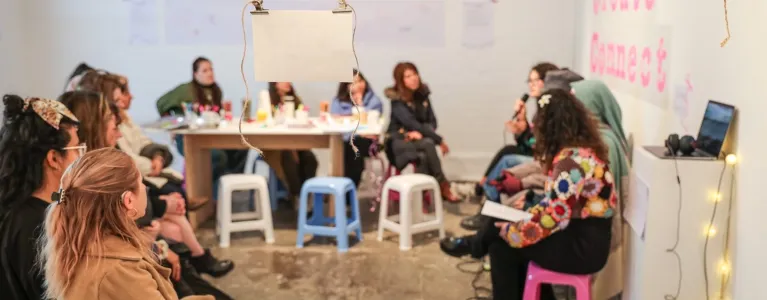
For many years Kalayaan has been delighted to offer Migrant Domestic Workers (MDWs) English classes and much more on Sundays. Alongside English classes, we offer community support and other services including immigration advice. For many MDWs, Sunday is their only day off from working in private households where they look after children, older people, people who are disabled and so much more. As well as the paucity of English classes on Sundays, these workers face other barriers to learning English including isolation and extremely long working hours.
The situation of Migrant Domestic Workers is not well known since, unlike other migrant workers, they are only allowed to work in private households, and all have arrived in the UK with their employer. Many of our learners became domestic workers because of financial difficulties in their countries of origin, and all were forced to leave their families behind. Migrant Domestic Workers mainly come from South-East Asia - the Philippines, India, Nepal, Indonesia amongst other countries. They typically move from those countries to the Middle East and then, accompany their employers to the UK. Many Migrant Domestic Workers report experiencing exploitation, discrimination and sometimes, abuse. Reports of enslavement rose dramatically after the introduction of the Overseas Domestic Worker Visa in April 2012, prior to which the visa could be renewed and lead to settlement in the UK after 5 years.
Kalayaan's legal staff have considerable expertise in the field of domestic servitude abuses and Kalayaan is a First Responder to the National Referral Mechanism. This is the government's system for dealing with modern slavery and human trafficking claims. Kalayaan's legal team have also provided expertise in successful claims in the Supreme Court. Kalayaan was established in the late 1980s to campaign publicly for rights and recognition of this workforce and uses evidence from its front-line services to guide its campaigning work to this day. Kalayaan continues campaigning for migrant domestic workers to have rights at work, including the unconditional right to change employer should they work for an abusive employer, and the right to renew their visa beyond six months, to give workers adequate time to safely exit abusive and exploitative work and find safe and decent alternative work elsewhere.
The good news is that at Kalayaan workers find a loving and supportive setting where they gain solidarity from being with their peers and can access the expertise of dedicated immigration advisers. As well as this, Kalayaan offers a range of services to its clients free of charge including general English classes and advice about tests for visa purposes, including the B1 Speaking and Listening test and the Life in the UK test. Classes run on Sunday morning and early afternoon. The morning class is pitched roughly at Entry Level 1, but teaching is designed to provide 'something for everyone'. The afternoon class is at roughly Entry 3. The afternoon class consists of Filipinas but all nationalities are welcome. The morning class currently consists mainly of Indonesian women but students from India and Sri Lanka also attend and benefit from 1-1 assistance from volunteers.
Over the years volunteers have played a key role in many of Kalayaan's activities, including the English classes. It is always a pleasure to work with them since they have a genuine interest in the situation of MDWs. Most of them are women from migrant backgrounds, and are thus able to share their life experiences with students. They also bring important language skills into the classroom, including Hindi and Tagalog, the national language of the Philippines. On occasions volunteers with teaching qualifications and/or experience lead the classes. We prepare classes ahead, so that volunteers can turn up on every second Sunday and assist or teach, rather than have to do onerous paperwork and admin.
The content of English classes is a mixture of MDW focussed items and areas of more general interest. Recent topics have included - MDWs in the 19th century, signposting, giving directions, deciding a picnic location, moving to London and much more. Twice a year there are outings in the London area and students always greatly enjoy these. There is a plan for all lessons, however, in the absence of targets and exams, lessons can develop in ways which suit the students, teachers and assistants.
In June, our community will come together again to mark International Domestic Workers Day. This takes place on June 16th every year and is in recognition of the International Labour Organisation’s Convention 189 that celebrates and recognises the work of domestic workers around the world. Kalayaan looks forward to celebrating this day with workers across the UK.
For more information about Kalayaan’s English Classes and how to get involved, please contact their coordinator Dominic Clarke at [email protected]. Find out more.